| |
|
| |
|
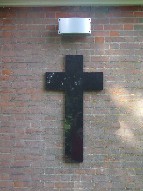 |
|
Anyone fascinated by what
happened to Anglicanism during the course
of the 20th Century ought to come to
Redgrave. In 1900, the Church of England
was on the cusp of its splendour, and the
next twenty years would see its star rise
to the highest point. And yet, less than
a century later, it has suffered a
massive loss of nerve, as its
significance, influence, and
congregations have waned in spectacular
fashion. It would be easy, and
understandable, for Anglicans to bewail
the fate of their Church, which is no
longer even the largest in the country in
terms of practicing adherents. But if, in
some places, it has pretty much lain down
and died, there are other parishes where
the Church of England has had the wit and
wisdom to reinvent itself for the future,
and Redgrave is one such place. This
pretty parish is a little unusual in that
the village which takes its name is not
the largest settlement in the parish.
That honour goes to Botesdale, which
jointly forms a tiny town with the
adjacent village of Rickinghall, and has
its own chapel of ease of St Botolph.
Redgrave's magnificent church of St Mary,
the mother church of the parish, sits
about a mile outside the village
surrounded by gently rolling fields, and
with one of the largest and most
interesting graveyards in East Anglia.
|
Redgrave
St Mary found itself in the news in the first
years of the new Millennium for rather bizarre
reasons. After years of
struggling on as a tiny congregation in one of
Suffolk's largest churches, the parish of
Redgrave controversially declared its church
redundant, against all advice and wishes of
outside bodies, in the safe knowledge that it
would be taken on by the Churches Conservation
Trust. Technically speaking, they were wrong to
do this - the CCT exists to take on redundant
churches that no one else can care for as a last
resort, but it will only take on those which the
Church of England asks it to, and these will only
be those important ones which have already been
declared redundant. It was never intended that
congregations would get out of repair bills by
declaring the building redundant.
There was even a suggestion
that, in a fit of pique, the CCT would not be
asked to take on Redgrave St Mary, but this of
course was not a reasonable outcome. Redgrave
parish had fiddled the system somewhat, although
it would certainly turn out to be a happy outcome
for their church, and the event generated a frisson
of interest in the parish. By 2007, Redgrave St
Mary had been chosen by the Daily Telegraph as
one of its village churches of the year, largely
and ironically because of the increased
involvement by local people in their now
redundant church.
| For a couple of
years, Redgrave's Anglicans went down the
road to Botesdale instead, but plans were
afoot to convert the village's mission
hall, built in 1897, into a more
appropriate 'worship space'. This was
opened in August 2008. The effect is very
much like stepping into a refurbished
congregational chapel. The east window
has been replaced by a design in perspex,
depicting a cross which looks a bit like
a dancer and a bit like a flame. From the
outside, it looks as if it should light
up at night, but is a little seemlier
from inside. People
I spoke to in the village were very
pleased with their 'new' church, and
understandably talked it up a bit - one
described it to me as 'the first new
village church in Suffolk for over a
century', which is techincally true if
you are just referring to the Anglican
variety, but seemed a curious claim to
make under the circumstances. In all
honesty, it must be a bit of a comedown
after the years of glory.
|
|
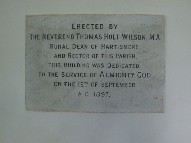 |
|
|
|
Simon Knott, October 2008
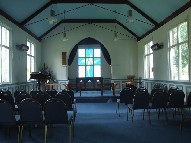 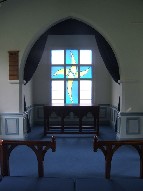 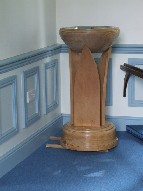 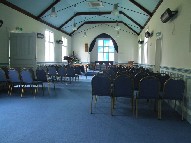
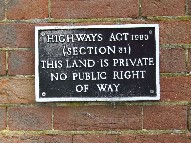
Amazon commission helps cover the running costs of this
site.
|
|
|

